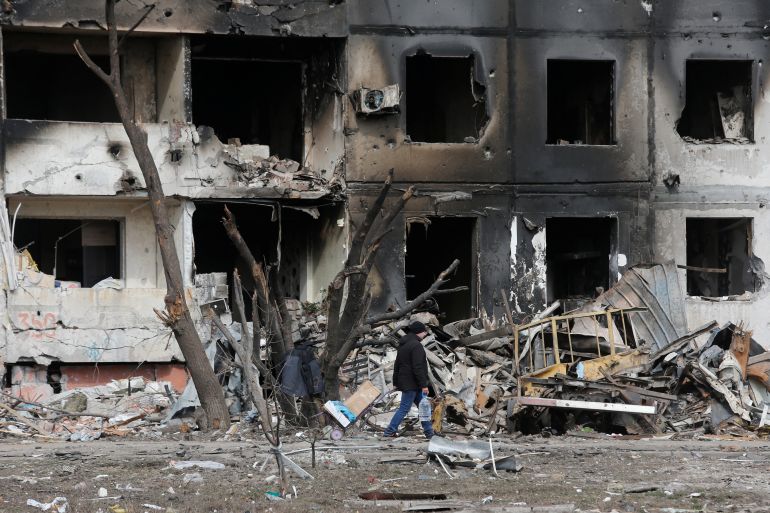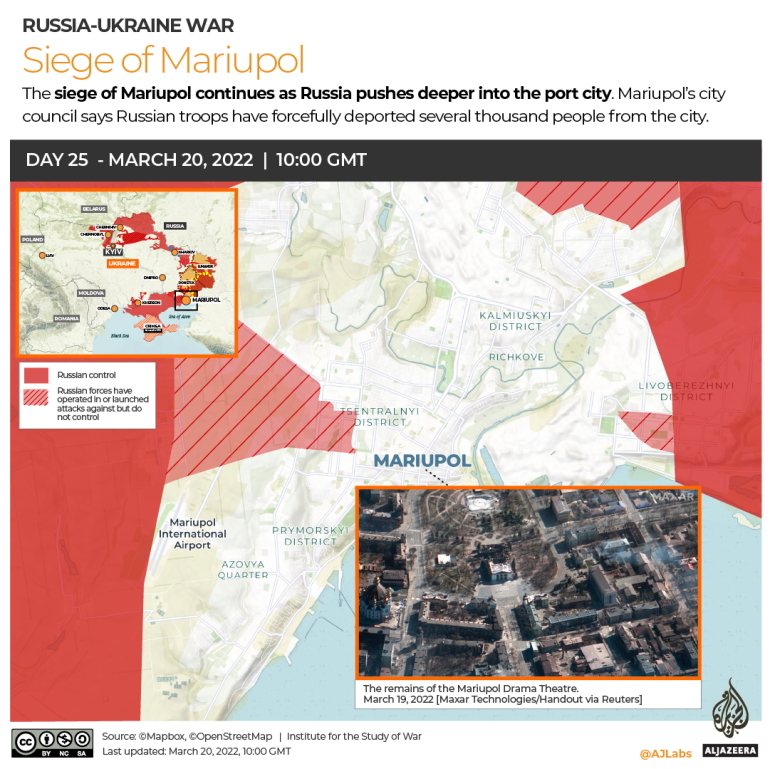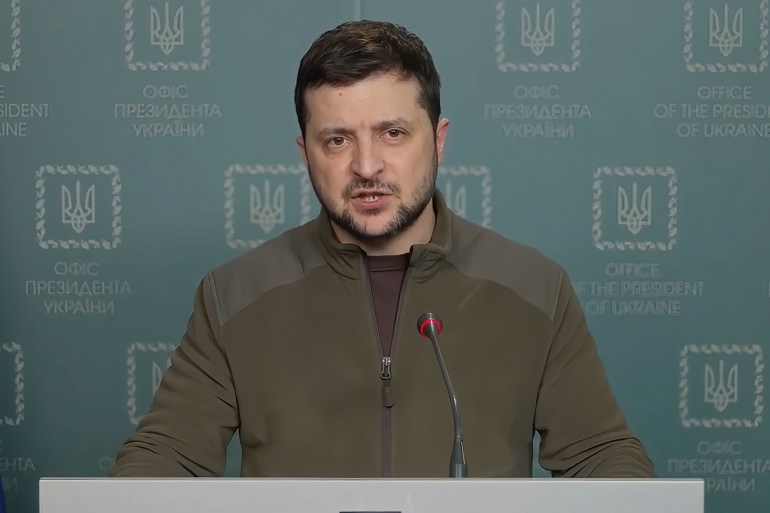Ukraine’s Zelenskyy says siege of Mariupol involved war crimes
The Ukrainian president says Russia’s siege of the port city is ‘a terror that will be remembered for centuries to come’.

Ukrainian President Volodymyr Zelenskyy has called the siege of Mariupol a “war crime”, as Russian forces pushed deeper into the strategic port city that has suffered continuous attacks since Moscow launched invasion late last month.
“To do this to a peaceful city, what the occupiers did, is a terror that will be remembered for centuries to come,” Zelenskyy said in a video address to the nation on Sunday.
Keep reading
list of 4 itemsAustralia bans alumina exports to Russia, steps up Ukraine aid
Ukraine latest updates: Zelenskyy asks Israel for weapons
What is China’s strategy on Ukraine?
Russian forces have pushed deeper into the besieged and battered city, where heavy fighting shut down a major steel plant and local authorities pleaded for more Western help.
In the capital, Kyiv, at least 20 babies carried by Ukrainian surrogate mothers are stuck in a makeshift bomb shelter, waiting for parents to travel into the war zone to pick them up. Some just days old, the babies are being cared for by nurses who cannot leave the shelter because of constant shelling by Russian troops trying to encircle the city.
The fall of Mariupol, the scene of some of the war’s worst suffering, would mark a major battlefield advance for the Russians, who are largely bogged down outside big cities more than three weeks into the biggest land invasion in Europe since World War II.

“Children, elderly people are dying. The city is destroyed and it is wiped off the face of the earth,” Mariupol police officer Michail Vershnin said from a rubble-strewn street in a video addressed to Western leaders.
Mariupol city council said on Sunday that Russian forces bombed an art school, where 400 residents had taken shelter, in the besieged port city.
Details also began to emerge on Saturday about a rocket attack that killed as many as 40 marines in the southern city of Mykolaiv the previous day, according to a Ukrainian military official who spoke to The New York Times.
Al Jazeera has, however, not been able to independently verify the report.
Russian forces have already cut Mariupol off from the Sea of Azov, and its fall would link Crimea, which Russia annexed in 2014, to eastern territories controlled by Moscow-backed separatists. It would mark a rare advance in the face of fierce Ukrainian resistance that has dashed Russia’s hopes for a quick victory and galvanised the West.
Ukrainian and Russian forces battled over the Azovstal steel plant in Mariupol, Vadym Denysenko, adviser to Ukraine’s interior minister, said. “One of the largest metallurgical plants in Europe is actually being destroyed,” Denysenko said in televised remarks.
The Mariupol city council claimed hours later that Russian soldiers had forcibly relocated several thousand city residents, mostly women and children, to Russia. It did not say where, and the claim could not be independently confirmed.
Zelenskyy adviser Oleksiy Arestovych said the nearest forces that could assist Mariupol were already struggling against “the overwhelming force of the enemy” and that “there is currently no military solution to Mariupol”.
Ukraine’s defence continues
Despite the siege in Mariupol, many remained struck by Ukraine’s ability to hold back its much bigger, better-armed foe. The United Kingdom’s Defence Ministry said Ukraine’s airspace continued to be effectively defended.
“Gaining control of the air was one of Russia’s principal objectives for the opening days of the conflict and their continued failure to do so has significantly blunted their operational progress,” the ministry said on Twitter.
Russia is now relying on standoff weapons launched from the relative safety of Russian airspace to hit targets within Ukraine, the ministry said.

Estimates of Russian deaths vary widely, but even conservative figures are in the low thousands. Russia had 64 deaths in five days of fighting during its 2008 war with Georgia. It lost about 15,000 in Afghanistan over 10 years, and more than 11,000 in years of fighting in Chechnya.
UN bodies have confirmed more than 847 civilian deaths since the war began, though they concede the actual toll is likely much higher. The UN says more than 3.3 million people have fled Ukraine as refugees.
Evacuations from Mariupol and other besieged cities proceeded along eight of the 10 humanitarian corridors, Deputy Prime Minister Iryna Vereshchuk said, and a total of 6,623 people left.